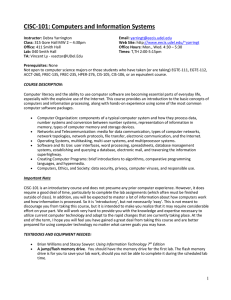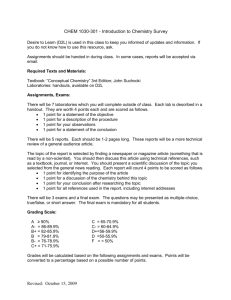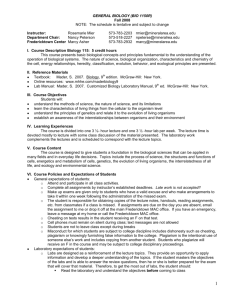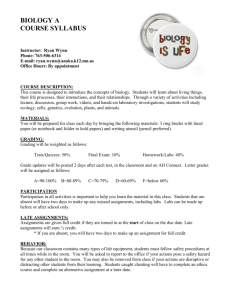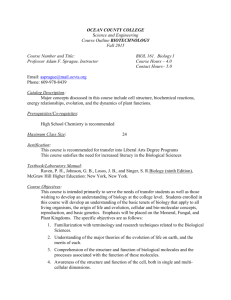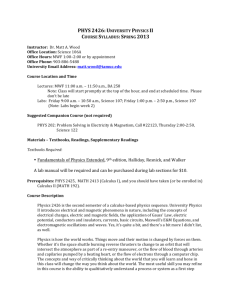1 Syllabus - Veritas Press
advertisement
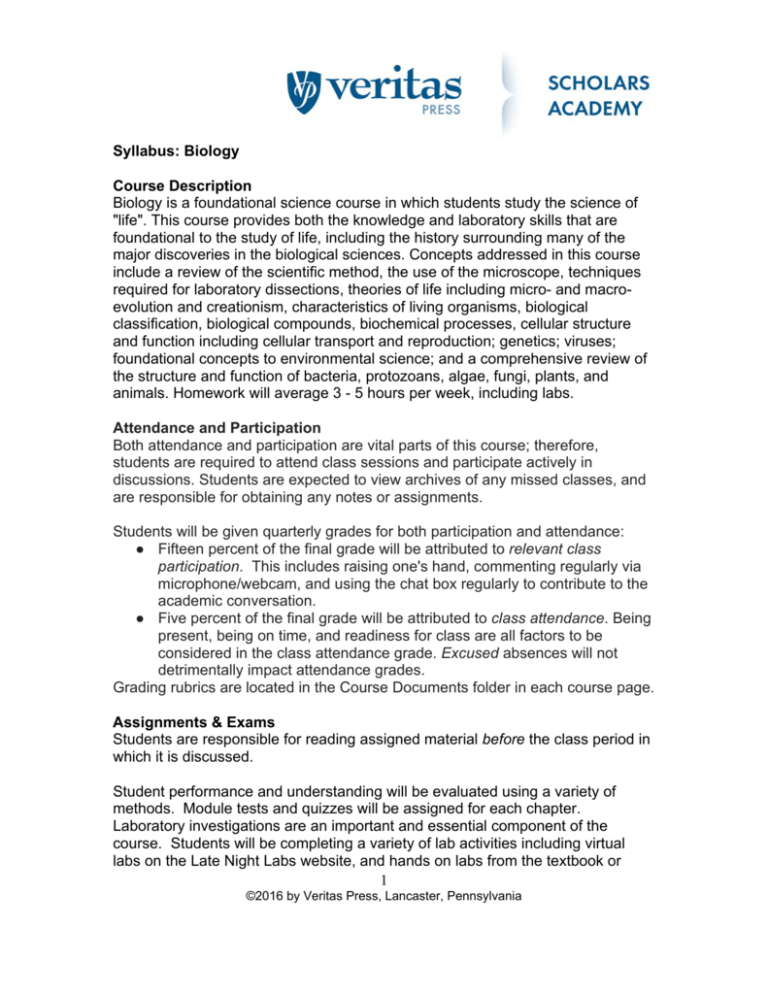
Syllabus: Biology Course Description Biology is a foundational science course in which students study the science of "life". This course provides both the knowledge and laboratory skills that are foundational to the study of life, including the history surrounding many of the major discoveries in the biological sciences. Concepts addressed in this course include a review of the scientific method, the use of the microscope, techniques required for laboratory dissections, theories of life including micro- and macroevolution and creationism, characteristics of living organisms, biological classification, biological compounds, biochemical processes, cellular structure and function including cellular transport and reproduction; genetics; viruses; foundational concepts to environmental science; and a comprehensive review of the structure and function of bacteria, protozoans, algae, fungi, plants, and animals. Homework will average 3 - 5 hours per week, including labs. Attendance and Participation Both attendance and participation are vital parts of this course; therefore, students are required to attend class sessions and participate actively in discussions. Students are expected to view archives of any missed classes, and are responsible for obtaining any notes or assignments. Students will be given quarterly grades for both participation and attendance: ● Fifteen percent of the final grade will be attributed to relevant class participation. This includes raising one's hand, commenting regularly via microphone/webcam, and using the chat box regularly to contribute to the academic conversation. ● Five percent of the final grade will be attributed to class attendance. Being present, being on time, and readiness for class are all factors to be considered in the class attendance grade. Excused absences will not detrimentally impact attendance grades. Grading rubrics are located in the Course Documents folder in each course page. Assignments & Exams Students are responsible for reading assigned material before the class period in which it is discussed. Student performance and understanding will be evaluated using a variety of methods. Module tests and quizzes will be assigned for each chapter. Laboratory investigations are an important and essential component of the course. Students will be completing a variety of lab activities including virtual labs on the Late Night Labs website, and hands on labs from the textbook or 1 ©2016 by Veritas Press, Lancaster, Pennsylvania other sources. Each student will receive an account on Late Night Labs. In addition, they will be required to purchase specimens for dissection. Some of the experiments use household materials. It is important that students complete ALL of these exercises in a high school laboratory science course. Students will prepare both formal and informal written lab reports documenting their lab work. These lab reports will be graded. Each student will also complete a mini research project, PowerPoint presentation and oral presentation at some time during the school year. A cumulative final exam will be given at the end of each semester. All exams should be taken in one sitting and proctored by an adult. Unless directed by the teacher, students are not permitted to use any helps, books, notes or the Internet on any portion of exams. All exams are due at 11:55 PM EST on the date shown. Specific instructions will be provided by the instructor. Evaluation The final grade is determined on the following basis: ● Class Attendance ● Relevant Class Participation ● Exams ● Formal Lab Reports ● Informal Lab Reports ● Quizzes ● Midterm/Final Assessment 5% 15% 20% 15% 10% 15% 20% Grading Scale The following grading scale will apply for all assignments and final grades. 100% – 90% = A; 89% - 80% = B; 79% - 70% = C; 69% - 0% = F. All grades are rounded to the nearest whole number. Late Work If a student fails to submit any assessment by the due date, it is considered “late.” ● Assignments submitted 0-24 hours late will result in a 10% reduction. ● Assignments submitted 24-48 hours late will result in a 20% reduction. ● Assignments submitted 48-72 hours late will result in a 30% reduction. ● Assignments over 72 hours late will not be accepted and the student will receive a zero. ● Student may request an extension from their teacher prior to the due date or in the case of an emergency. ● Failed late work is eligible for a retake, and must be returned within one week of the original return date. While we love grace and the opportunity to exercise it, we also desire to instill a sound sense of responsibility in our students, hence these expectations pertaining to late work. 2 ©2016 by Veritas Press, Lancaster, Pennsylvania Exam/Test Retakes Any student may retake a failed assessment (except quizzes), but can score no higher than 70% on the retake. Retakes must be submitted within one week of the returned, failed test. If the retake is not submitted within one week, the original failing grade will stand. Academic Dishonesty Cheating on any assignment is considered academic dishonesty. This includes plagiarism in any form. Cheating will be dealt with in the following manner: ● If a student is caught cheating, he will receive a zero on the assignment and will be placed on academic probation for the remainder of the school year. ● If the same student is caught cheating again, he will likely be expelled. ● No refunds will be granted for students who are expelled due to cheating. ● A Disciplinary Action Form will be submitted by the student’s teacher for any instance of academic dishonesty. Textbooks The books needed for the class can be purchased through Veritas Press. It is extremely important that the student has the correct version of these materials. Biology Course Kit (003558) ● Exploring Creation with Biology Student (044021) ● Exploring Creation with Biology Solutions/Tests (044016) ● Exploring Creation with Biology Companion CD (044017) ● Late Night Lab account ● The following items are also required, but unfortunately, are not available through Veritas Press: Dissection Specimens that include an earthworm, crayfish, perch, and frog, as well as dissection tools. Course Calendar See Course Assignment Sheet, located on course page, for class dates, breaks and all assignments and assessments. Class dates and breaks can also be found on the current academic year calendar. 3 ©2016 by Veritas Press, Lancaster, Pennsylvania

